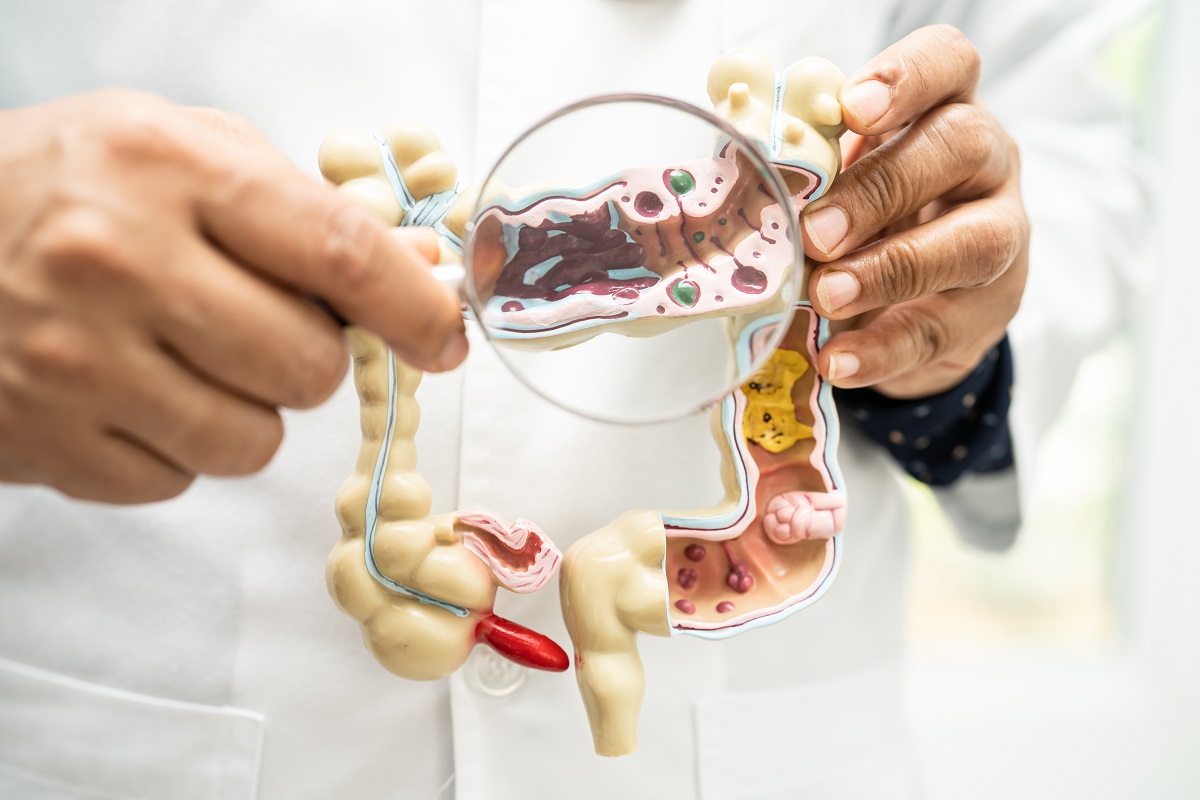A group of disorders that cause long-term (chronic) inflammation of the digestive tract tissues is called inflammatory bowel disease (IBD). These include:
- Ulcerative colitis – A disease in which a person experiences ulcers (sores) and inflammation along the large intestine (colon) lining and rectum.
- Crohn’s disease – This condition affects mostly the small intestine but it can affect the large intestine too. People with Crohn’s disease experience inflammation of the digestive tract lining.
The most common symptoms of both conditions include rectal bleeding, abdominal pain, extreme tiredness (fatigue), weight loss, and diarrhea. Moreover, inflammatory bowel disease ranges between patients from mild to severe. In addition, some people with IBD can experience life-threatening complications.
Symptoms
The symptoms appear differently among people because it depends on the type of IBD you experience, the severity of the condition, and other factors. Check below some symptoms that often occur in both IBD types:
- Fatigue
- Unusual weight loss
- Decreased appetite
- Belly cramping or pain
- Diarrhea (sometimes with blood)
If you experience any of the previous symptoms or notice prolonged changes in bowel movements, you should consult a doctor right away. Although IBD is not a fatal condition, without treatment, it may cause serious complications.
Causes
Experts do not fully understand the exact cause of IBD. In the past, some physicians suspected that stress and diet cause IBD but now they know that previous factors can worsen IBD and are not the causes.
Other healthcare providers think that immune system malfunction could play a role. Thus, the body’s defense (immune system) tries to destroy invading viruses or bacteria, which also negatively affect cells in the digestive tract.
Moreover, there are some gene changes (mutations) that are often associated with IBD. It means that people with a family history of IBD are more prone to develop it. In any case, most people with IBD do not have a family history.
Risk Factors
- Age – While most people develop this condition before 30 years old, others do not develop it until they reach 50 or 60 years old.
- Ethnicity and race – Inflammatory bowel disease occurs more commonly in white people.
- Family history – This risk factor increases significantly your risk of developing IBD.
- Cigarette smoking – This is one of the most important factors that lead to Crohn’s disease. Although smoking can help to prevent ulcerative colitis, the risks outweigh the benefits anyway. However, you should quit smoking or never start because it may improve your digestive tract and provide other health benefits.
- Nonsteroidal anti-inflammatory drugs – This group of medicines can elevate your risk of inflammatory bowel disease or aggravate the condition in people with IBD. These include Aspirin, Naproxen sodium, Diclofenac sodium, Ibuprofen, and others.
What Are The Possible Complications of Inflammatory Bowel Disease?
Some of the complications are in common while others are specific to each IBD type. Check below the complications found in both IBD types:
- Colon cancer – Both conditions (ulcerative colitis and Crohn’s disease) negatively affect most of the colon, which leads to an increased risk of developing colon cancer. Colonoscopy is a test recommended for people with IBD and this test should be done regularly.
- Inflammation of the eyes, joints, and skin – During flare-ups of inflammatory bowel disease, you may experience the following conditions. These include arthritis, skin lesions, and uveitis (inflammation of the eye).
- Adverse reactions of medicines – There are some IBD drugs linked with an elevated risk of infections. For instance, corticosteroids are usually associated with a high risk of hypertension (high blood pressure), osteoporosis (brittle bones), and others.
- Primary sclerosing cholangitis – This is a rare complication in which scarring of the tissues within bile ducts occurs. In such cases, it causes reduced bile flow that may provoke liver damage.
- Blood clots – For people with IBD, there is an increased risk of blood clots in the veins and arteries.
- Severe dehydration – It usually occurs in people with severe diarrhea.
Crohn’s Disease Complications
- Bowel obstruction – This autoimmune condition (Crohn’s disease) impacts the thickness of the intestinal wall. Thus, certain bowel parts can narrow and thicken, which can lead to blocked digestive contents. In such cases, people usually require surgery to remove the affected part of the bowel.
- Malnutrition – Abdominal pain and persistent diarrhea make it challenging for the intestines to absorb nutrients and keep you nourished. In addition, people who experience malnutrition can also develop anemia due to low iron levels or reduced vitamin B-12.
- Fistulas – In some cases, the inflammation can spread completely through the intestinal wall causing fistulas (abnormal connections between body parts). The most common fistula type happens near or around the anal region (perianal). However, some people may experience an abscess (it appears when fistulas become infected and make a pocket of pus).
- Anal fissure – In such cases, a small tear appears in the anus lining tissue or in the skin that surrounds the anus. Therefore, it may lead to infections, perianal fistula, and others.
There are some complications associated with ulcerative colitis. Examples include:
- Toxic megacolon – This is a condition in which the colon quickly widens and swells.
- Perforated colon – In most cases, a hole in the colon (perforated colon) appears due to a toxic megacolon but it may happen on its own.
Diagnosis
Healthcare providers usually perform different laboratory tests and procedures to diagnose this condition. Check below some of them:
Laboratory Tests
- Stool studies – This procedure involves a sample of stool that doctors test for hidden organisms (such as parasites) or blood.
- Anemia or infection tests – To determine if you have anemia or an infection, doctors need to perform a blood test only. They will look for the amount of red blood cells and bacteria and viruses that usually provoke infections.
Endoscopic Procedures
- Colonoscopy – This is a procedure that allows your doctor to see the complete colon. It involves a thin and flexible tube with a camera at the end. Moreover, during a colonoscopy, doctors may remove a sample of tissue for laboratory analysis (biopsy).
- Flexible sigmoidoscopy – This test involves examination of the rectum and sigmoid (the last portion of the colon).
- Upper endoscopy – Doctors use a flexible tube to examine the esophagus, stomach, and the first small intestine part (duodenum).
- Capsule endoscopy – This is a procedure that usually helps physicians diagnose Crohn’s disease. It involves swallowing a capsule that contains a camera that sends images to a recorder. Thereafter, this capsule exists easily through the stool. However, in some cases, doctors need also to perform an endoscopy with a biopsy to confirm the condition. This procedure should not be used if you have a bowel obstruction.
- Balloon-assisted enteroscopy – This test allows doctors to look into the small intestine, which regular endoscopes cannot reach. It is often performed when your doctor notices abnormalities using a capsule endoscopy.
Imaging Tests
- X-ray – Doctors commonly recommend this test when the patient experiences severe symptoms.
- CT (computerized tomography) scans – These scans are done to get detailed images of the colon and small bowel.
- MRI (magnetic resonance imaging) – This test involves magnetic fields and radio waves to make images of different body organs and tissues. It mostly is used to evaluate fistulas that could appear in the anal region or small intestine.
Treatment
The goal of the treatment is to lessen inflammation that provokes the symptoms. Generally, doctors try to transfer IBD in long-term remission and decrease the risks of complications. Doctors usually prescribe the following treatment options if you suffer from inflammatory bowel disease. For example:
Anti-inflammatory Medicines
The treatment usually begins with these medications. These include Aminosalicylates (including Mesalamine, Balsalazide, and Olsalazine). Anti-inflammatory drugs are mostly used in people with mild or moderate ulcerative colitis.
Additionally, long-term corticosteroid courses can induce IBD in remission. What medicines you will take depends on which intestine part is negatively affected.
Immune System Suppressors
Doctors may sometimes prescribe immune suppressants that reduce immune system response. These chemicals produced by the immune system damage the digestive tract lining. Commonly, doctors prescribe Azathioprine, Mercaptopurine, and Methotrexate.
Recently, some medicines were approved for IBD treatment. These include Ozanimod, Upadacitinib, and Tofacitinib. However, the FDA issued a warning about Tofacitinib because some studies showed that this medicine can provoke serious heart problems and cancer. In any case, if you are using this medicine do not stop it until you consult with your healthcare professional.
Biologics
This is a new category of medications used to destroy certain proteins in the body that provoke inflammation. Some of them are IV (intravenous) infusions but others are injections that you can give yourself. For example Infliximab, Adalimumab, Golimumab, Certolizumab, Vedolizumab, Ustekinumab, and Risankuzumab.
Antibiotics
Doctors can prescribe antibiotics (such as Ciprofloxacin and Metronidazole) to treat infections caused by bacteria. These medicines are prescribed along with other treatment options.
Other Supplements and Medicines
Along with primary treatment, doctors may prescribe some medicines to reduce the symptoms. However, you should consult with your doctor before administering any over-the-counter medication. Check below some examples:
- Medicines to reduce diarrhea – These include fiber supplements (such as Psyllium powder or Methylcellulose) and Loperamide (for severe diarrhea). Sometimes, previous medicines are not effective, talk with your doctor before using them.
- Painkillers – If you experience mild pain, physicians usually recommend Acetaminophen. Naproxen sodium, Diclofenac sodium, and Ibuprofen may worsen the symptoms and condition as well.
- Vitamins and supplements are advised by doctors for people with nutritional deficiencies.
Surgery
If you do not notice any improvements while following a treatment which includes lifestyle changes, drug therapy, diet, and other treatments, surgery is required. Check below some surgery types used to treat IBD:
- Ulcerative colitis surgery – This procedure involves the removal of the entire colon and rectum. Sometimes, it is not possible to perform this surgery and surgeons will make a permanent opening in the abdomen to attach a bag in which the stool will be collected.
- Crohn’s disease surgery – Approximately 70-80% of people with Crohn’s disease require surgery. Unfortunately, even surgery cannot cure this condition. During this procedure, surgeons will remove the affected part of the digestive tract and reconnect healthy tissues.Commonly, the benefits of surgery for this autoimmune disease are temporary. To reduce the risk of complications and recurrence of the disease, you should get treatment after surgery (including medicines, therapies, and others).
Frequently Asked Questions
What is the difference between inflammatory bowel disease (IBD) and inflammatory bowel syndrome (IBS)?
While both conditions provoke similar symptoms (including prolonged diarrhea, abdominal pain, blood stools, unusual weight loss, and extreme tiredness), IBD mainly affects joints or skin. Inflammatory bowel syndrome provokes inflammation of the mucus membrane of the GI tract.
What foods should be avoided by people with IBD?
Usually, doctors recommend avoiding bread, cereals, and granola bars with a large amount of bran and whole grains. You should also avoid approximately all raw fruits and vegetables. Discuss with your healthcare professional for more details.
What are the potential complications of IBD?
- Liver disease
- Anemia (low red blood cell count)
- Bowel obstruction
- Osteoporosis
- Colon cancer
- Arthritis
- Kidney stones
- Fistula
- Thrombus
- Malnutrition and others.
If you have additional questions, ask your healthcare professional.




